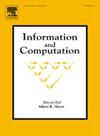零知识参数和公钥加密
IF 0.8
4区 计算机科学
Q3 COMPUTER SCIENCE, THEORY & METHODS
引用次数: 0
摘要
在本文中,我们考虑了一个额外的短随机字符串被所有用户共享的Diffie-Hellman公钥模型。这一点。我们称之为公钥公共随机性(Public-Key Public-Randomness, PKPR)模型,它非常强大,因为我们证明了它支持重要加密原语的简单非交互式实现。我们给出了PKPR模型中遗忘转移的非交互实现。我们的实现对于具有无限计算能力的接收器是安全的。在此结果的基础上,我们证明了NP中的所有语言在PKPR模型中都具有完美的零知识参数。本文章由计算机程序翻译,如有差异,请以英文原文为准。
Zero-Knowledge Arguments and Public-Key Cryptography
In this work we consider the Diffie-Hellman public-key model in which an additional short random string is shared by all users. This. which we call Public-Key Public-Randomness (PKPR) model, is very powerful, as we show that it supports simple non-interactive implementations of important cryptographic primitives. We give a noninteractive implementation of Oblivious Transfer in the PKPR model. Our implementation is secure against receivers with unlimited computational power. Building on this result, we show that all languages in NP have Perfect Zero-Knowledge Arguments in the PKPR model.
求助全文
通过发布文献求助,成功后即可免费获取论文全文。
去求助
来源期刊

Information and Computation
工程技术-计算机:理论方法
CiteScore
2.30
自引率
0.00%
发文量
119
审稿时长
140 days
期刊介绍:
Information and Computation welcomes original papers in all areas of theoretical computer science and computational applications of information theory. Survey articles of exceptional quality will also be considered. Particularly welcome are papers contributing new results in active theoretical areas such as
-Biological computation and computational biology-
Computational complexity-
Computer theorem-proving-
Concurrency and distributed process theory-
Cryptographic theory-
Data base theory-
Decision problems in logic-
Design and analysis of algorithms-
Discrete optimization and mathematical programming-
Inductive inference and learning theory-
Logic & constraint programming-
Program verification & model checking-
Probabilistic & Quantum computation-
Semantics of programming languages-
Symbolic computation, lambda calculus, and rewriting systems-
Types and typechecking
 求助内容:
求助内容: 应助结果提醒方式:
应助结果提醒方式:


